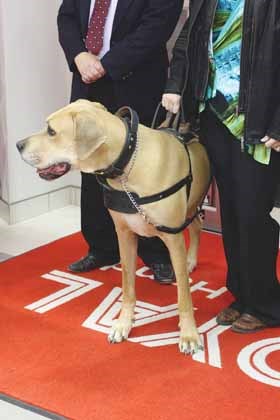Angela Shaw has her good days and her bad days. "That's MS [multiple sclerosis]," she said.
Both the good days and the bad ones have gotten better for Angela since she met Toffee, her five-year-old British Great Dane service dog.
In the public perception, service dogs are almost exclusively the domain of the blind.
"We're trying to change that," Angela said. Angela adding that she and Toffee travel and do public speaking on the subject.
The British breed is perfect for a person with MS, Angela said. Toffee is shorter and tougher than the American breed and, at 240 pounds, can help Angela in and out of bed, keep her moving when her legs don't want to work and provide her with stability when she feels unsteady.
Before Toffee, Angela was in a wheel chair or had to use a walker. "I was so frustrated with life," she said. "I spent most of it sitting watching the world pass me by. He's given me my life back."
The wheelchair and walker are now in storage. Even the apparatus she had installed in her bedroom to get her in and out of bed is a memory. "I don't even use my cane anymore, because I trust him to keep me up."
On the bad days, when Angela can't get out of bed, Toffee will open the refrigerator and bring her a jug of milk. He helps with dropped items, doors and lights. He can even sense changes in Angela's condition and encourage her to rest or sit down.
And he is not just a boon to Angela, but to the whole family. She tears up at the thought of the impact her disease had on them.
"My kids had to give up part of their childhood because they had to get mom things," she said.
And her husband, Gord, who was starting to develop Carpal Tunnel Syndrome and have shoulder problems from moving her, has been relieved of much of those duties.
Angela's MS is the rare genetic-onset form of the disease. The oldest girl in each of the last three generations of her family has been stricken.
Toffee, who was a rescue dog, was originally being trained by RCMP in Red Deer to be a drug-sniffing dog, but he wasn't really working out. One of the K9 officers, who Angela only remembers by the nickname Pumpkin was a close friend of Angela's mother who was herself a dog trainer. Pumpkin offered Toffee to Angela and within six months they had trained him to be exactly what Angela needed him to be.
It's not just awareness of service dogs that Angela wants to promote, though. She said people need to avail themselves of the resources available to them, such as the Annual MS conference she attended last weekend in Saskatoon.
"There wasn't enough people that I know [in Yorkton] with MS there," she said. "I really encourage people to reach the MS Society more than they're doing. The MS Society of Saskatchewan is amazing."
There have been some interesting developments in MS research recently.
First, there is what is being called the Liberation Treatment developed by an Italian researcher who believes there is a causal link between narrowed neck veins that reduce blood flow and allow iron deposits to build up in the brain.
Researchers at the University of British Columbia Hospital MS Clinic are currently recruiting patients for a clinical trial planned to involve approximately 100 patients from B.C. and Quebec.
Meanwhile, the Saskatchewan government is providing funding for 86 of this province's MS patients to participate in a clinical trial in Albany, New York.
There have been mixed reviews of the treatment. For example, an observational study of several people from Newfoundland and Labrador who went overseas for the treatment found no appreciable benefit.
Angela is taking a wait and see attitude with the Liberation Treatment.
"It's not proven," she said. "I'm waiting for the double-blind to finish."
Another potentially promising development has connections with the University of Saskatchewan. Dr. Valerie Verge, director of the Cameco MS Neuroscience Centre at U of S, spoke at the MS conference.
Verge is part of a team of Canadian researchers under the direction of Dr. Doug Zochodne, a University of Calgary neuroscientist that is developing a novel technique for repairing nerve damage.
"We have identified some of the key repair molecules and how to regulate them," Verge said. "We are close to knowing how to use computer chips to assist the process."
In MS patients damage to the nervous system is created by the person's own immune system attacking a substance called myelin that protects the conduits between nerve cells (called axons). With the communication between nerve cells disrupted, MS sufferers can lose feeling and control over their bodies.
Angela was very encouraged by what she heard at the conference, but no one knows for sure how far away scientists are from a cure for MS. In the meantime, Angela believes people with MS should definitely investigate whether a service dog is right for them.



